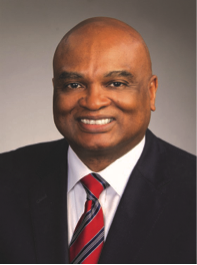
Emille Williams is the Interim President and CEO of the Central Ohio Transit Authority (COTA), a regional transit company in the Columbus metro area. Before joining COTA, Emille worked for Southeastern Pennsylvania Transportation Authority (SEPTA) in Philadelphia.
During his twenty-year career at SEPTA, Emille helped the agency establish innovative technology solutions that helped keep customers safe and the trains moving on time.
Emille is a 2017 Eno Transit Senior Executive Program (TSE) Alumni, a Leadership Columbus 2017 Alumni, and currently serves on the Columbus City Year Board and on the National Board of Directors for the Conference of Minority Transportation Officials (COMTO).
With his years of experience and accolades, I wanted to hear Emille’s story. I sat down with him to discuss leadership, success, and style.
Emille defines great leadership as “the ability to motivate employees/teams towards a common goal or a vision using influence and charisma.” He underlines that the leaders needs to be the one who sets the clear vision and the best ways to motivate a team to reach that vision, is through influence and charismatic behavior.
His core values touch on his passion for advancing the industry and his humility in serving others. He mentioned “doing the right thing and doing it right”, having an even temperament, pushing boundaries to continually grow the mind, body, and spirit of himself and those around him, being passionate and enthusiastic about the work, having courage to try innovative and creative ideas while maintaining your humility in understanding that not everything works every time. He mentions how critical making long lasting relationships are to ensuring that you are serving your community.
Emille defines his leadership style as “inclusive, engaging, and highly collaborative.” He says with every leadership style there are strengths and drawbacks. This inclusive and collaborative style, engages people, bringing them into the fold, giving them ownership over the decision-making process, resulting in new ideas from different perspectives. One drawback, however, is that it can make it a lengthy process, where in a time sensitive situation this style can be more difficult.
He measures his success by more than what he receives, but by what he is able to give back. He doesn’t look at wealth or position; his determines his success by the goals he sets for himself and how well he accomplished them. He believes success is “inspiring others to believe in themselves.”
Emille had many recommendations for professionals looking to take on more leadership roles. He emphasized outward facing actions such as presenting yourself in a positive light, being humble, exhibiting actions that people will want to emulate, finding a mentor, and building trust through genuine and effective communication. He also emphasized inward facing actions such as establishing your own rules of conduct, being passionate about your work, stretching yourself, studying past leaders, trying out new styles to find what works best for you, setting goals, and holding yourself accountable to such goals. Finally, he emphasizes being yourself. If you can’t be yourself in a new role or job, it may not be the right fit for you.



